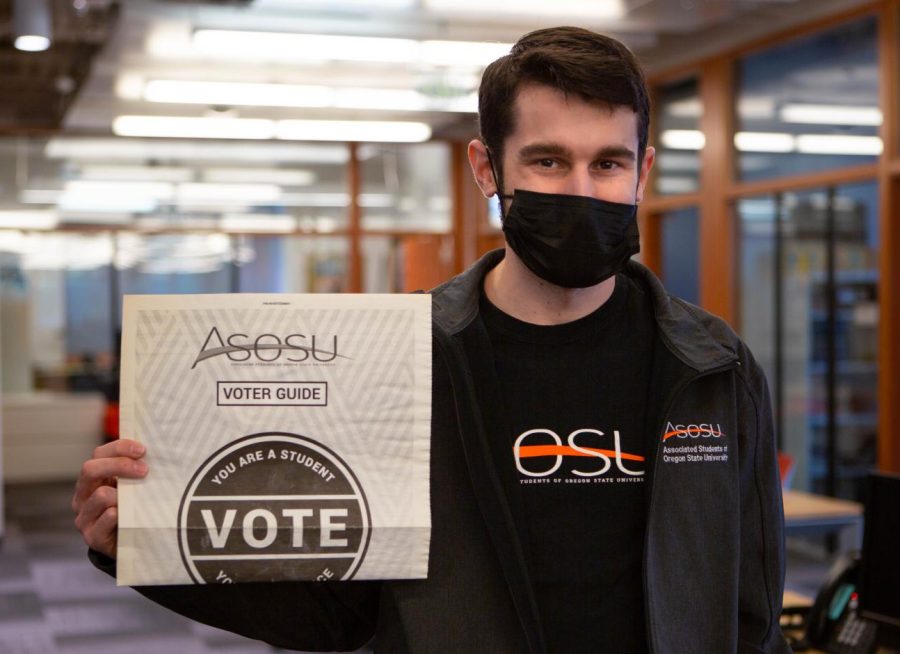ASOSU Elections Committee changes election process, extends voting time for students
Dylan Perfect, the vice president for the Associated Students of Oregon State University and ex officio chief elections officer holds a voter’s guide in the ASOSU office located in the Student Experience Center. The voting for candidates of any position will be open to students on Feb. 14.
February 7, 2022
The Associated Students of Oregon State University’s Elections Committee have changed the elections process to include components such as longer registration and voting periods.
Like in previous years, the ASOSU elections have competitive races for president and vice president—on one ticket collectively—speaker of the house, senators, representatives and student fee committee members. Unlike last year, the 2022 EC has made many changes to how students can run for the positions.
According to the ASOSU elections packet, some of these changes include how election materials are approved as well as the time period available to appeal for a campaign violation.
“[These changes are] partly in response to past years’ elections and trying to look at certain opportunities to improve the process, and partly just on other determinations that the elections committee makes from year to year,” said Dylan Perfect, the
ASOSU vice president and ex officio chief elections officer.
Other changes, according to the elections packet, include having a campaign season that is twice as long, having the voter ballot available for almost three weeks and candidate registration open after the election season starts.
“Interestingly, right now, the EC has a lot of leeway in how it establishes the elections packet and the election rules for each cycle,” Perfect said. “So that’s something I might actually like to see reigned in a little bit.”
Perfect said he wants the EC to have less power to change the elections packet because candidates often have to wait for the packets to be released in order to read through the official rules for candidates, but according to Perfect, it is ultimately up to the ASOSU Congress to change this aspect of elections.
For the past two years, some student elections have also been uncontested, such as the speaker of the house. In an attempt to prevent this from happening again, the EC is allowing people to apply to run after the campaign season has started, so people who are interested in running but not entirely sure can see how many others are competing for the same position.
“Any student who is eligible to run, and believes that they would be a good fit for the position, we encourage [them] to run,” Perfect said.
The ASOSU campaign season began on Jan. 12 but the candidate applications do not close until Feb. 8.
According to Angie Geno, the ASOSU senator and ethics committee vice chair, the EC and ethics committee work together to prioritize transparency between candidates and other individuals involved.
“We really make sure every student has an equal opportunity to succeed in whatever positions they run for,” Geno said.
Geno said she thinks students should use the ASOSU elections as an opportunity to engage with their campus and be a part of the voice for other students.
The changes, according to Uwe Keist, the ASOSU public relations coordinator, are also an attempt to increase the amount of voters who participate in the elections.
“When students have a greater opportunity to campaign, we’re more likely to see more student votes,” Geno said.
Last year, when the campaign season was less than a month long, there was a 7.13% voter turnout. In 2017, the voter turnout was 12.7% after an increase in the time of the election process.
Despite increasing national election distrust, Geno said she does not think this distrust is affecting participation in ASOSU elections due to it being low impact compared to national politics.
“[The distrust] might be a reason why students are participating more; it’s a ‘Oh, this is something I can control, this is something that my direct voice will play a role into,’” Geno said. “That might even be more encouraging for students to participate in than maybe just thinking, ‘Oh, they’re just like our government.’”
Keist also said he does not think the distrust around national voting has affected the ASOSU elections.
“I believe that the trust in the system in the ASOSU elections is higher than the U.S. system, though I cannot say that that is a concrete fact,” Keist said.
Perfect said there are no current plans in place to change the voting process if COVID-19 cases continued to rise in the coming months.
“If OSU does find itself implementing policies where everything is online and there are strict COVID-19 precautions, it is expected that candidates comply with all university policies and procedures, that is a part of the election guidelines,” Perfect said.
Last year’s elections, however, did take place almost entirely online and can transition back online if needed.
“All of our voting is done online anyway, so its equal accessibility at all times for students and campaigning can also still be done through social media,” Geno said.
Voting ballots for the elections open on Feb. 14 and close on March 4 at 5 p.m.











































































































